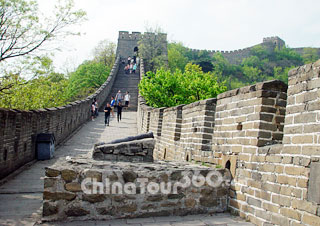 Mutianyu
Mutianyu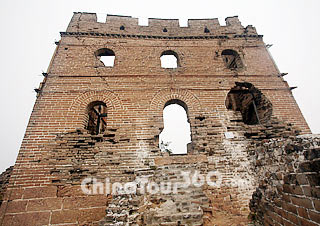 Panlongshan Great Wall
Panlongshan Great Wall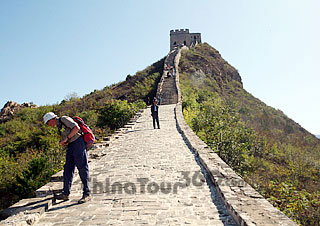 Simatai
Simatai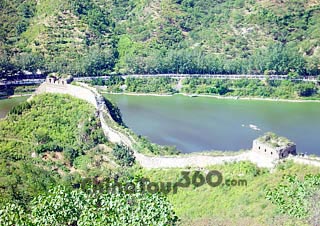 Huanghuacheng
Huanghuacheng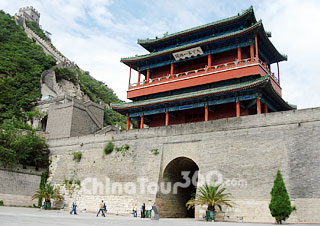 Juyongguan Pass
Juyongguan Pass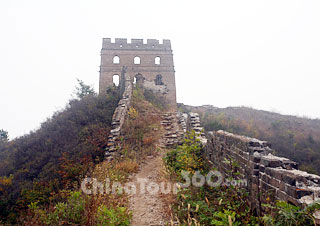 Gubeikou
Gubeikou
![]() Beijing Great Walls:
Beijing Great Walls:
Badaling Mutianyu Simatai Shuiguan
Jinshanling Jiankou Gubeikou
Juyongguan Pass Huanghuacheng
Great Wall in Beijing stretches for about 600 km (373 miles) from east to west with most of the walls constructed during the Ming Dynasty (1368 - 1644). It has become the must-see attraction in the city.
According to research, 10 sections of wall went through the city, and they were built in the Warring States Period (476BC - 221BC), Qin (221 BC - 207 BC), Han (206 BC - 220 AD), Jin (265 - 420), Southern and Northern (386 - 589), Sui (581 - 618), Tang (618 - 907) and Ming (1368 - 1644) Dynasties. Most of the walls we can see were built in the Ming dynasty and only a few relics of Northern Qi of the Southern and Northen Dynasties can be found.
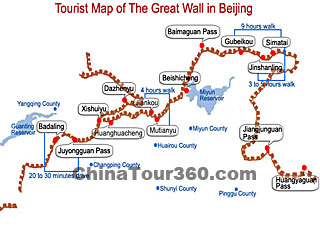 |
| Click the map to enlarge it, or go for more Beijing Great Wall Maps |
In 1368, Zhu Yuanzhang defeated the Mongolians and established the Ming Dynasty in Beijing. To defend against the Mongolians in the north and the Nüzhen people in the northeast, the Ming Dynasty government started to rebuild and renovate the walls based on those of earlier dynasties. It is recorded that during the 276 years of the Ming Dynasty, the walls were reconstructed and mended over 20 times. The walls in the city were mostly completed during this period, and were very firm and strong because of the crucial location, near the capital of the dynasty.
![]() Badaling: Known as the most famous section in China, Badaling is the must-see attraction of any tour of China. It is the outstanding representation of Ming-dynasty wall. From 1505 to 1582, the Badaling was renovated four times to a complete defence system of forts, castles, guards and beacon towers.
Badaling: Known as the most famous section in China, Badaling is the must-see attraction of any tour of China. It is the outstanding representation of Ming-dynasty wall. From 1505 to 1582, the Badaling was renovated four times to a complete defence system of forts, castles, guards and beacon towers.
![]() Juyongguan Pass: It is located about 60 km (32 miles) from the city. As one of the most important passes along the wall, it has a history of over 2,000 years and was finally completed in the Ming Dynasty. This section is famous for not only its significant location but the gorgeous scenery of rolling mountains, green forest and limpid streams.
Juyongguan Pass: It is located about 60 km (32 miles) from the city. As one of the most important passes along the wall, it has a history of over 2,000 years and was finally completed in the Ming Dynasty. This section is famous for not only its significant location but the gorgeous scenery of rolling mountains, green forest and limpid streams.
![]() Mutianyu: With a history of 600 years, it was constructed by Xu Da, a famous general of the Ming Dynasty. After Zhu Yuanzhang established the Ming Dynasty, he ordered the construction of many important sections, and Mutianyu was one of these. Mutianyu connects Juyongguan pass and Badaling in the west, and Gubeikou and Jinshanling in the East, stretching along the steep mountain ridges of the Yanshan Mountain.
Mutianyu: With a history of 600 years, it was constructed by Xu Da, a famous general of the Ming Dynasty. After Zhu Yuanzhang established the Ming Dynasty, he ordered the construction of many important sections, and Mutianyu was one of these. Mutianyu connects Juyongguan pass and Badaling in the west, and Gubeikou and Jinshanling in the East, stretching along the steep mountain ridges of the Yanshan Mountain.
![]() Simatai: It was initially built in 1368 and renovated between 1568 and 1574 by Qi Jiguang, a famous general in the Ming Dynasty. It is known for its steep walls, fantastic structures and crucial position. Simatai is also famous for the original architecture of the Ming Dynasty.
Simatai: It was initially built in 1368 and renovated between 1568 and 1574 by Qi Jiguang, a famous general in the Ming Dynasty. It is known for its steep walls, fantastic structures and crucial position. Simatai is also famous for the original architecture of the Ming Dynasty.
![]() Gubeikou: Situated 125 km (78 miles) north of the city, Gubeikou is the important path between the city and the grassland in Inner Mongolia, and one of the most significant passes of the Chinese Great Wall. Gubeikou was initially built between 550 and 559 during the Southern and Northern Dynasties, but was destroyed by erosion. The present Gubeikou was all built in the Ming Dynasty. The broken walls and ruins in Gubeikou show the trace of history.
Gubeikou: Situated 125 km (78 miles) north of the city, Gubeikou is the important path between the city and the grassland in Inner Mongolia, and one of the most significant passes of the Chinese Great Wall. Gubeikou was initially built between 550 and 559 during the Southern and Northern Dynasties, but was destroyed by erosion. The present Gubeikou was all built in the Ming Dynasty. The broken walls and ruins in Gubeikou show the trace of history.
![]() Jinshanlling: It was first built in 1368 by Xu Da, and renovated in 1567 by Qi Jiguang and Tan Lun, a Ming Dynasty officer. This section totals 10.5 km (6.5 miles) from Longlingkou in the west to Wangjing Tower in the east. It is the best-preserved Ming-dynasty wall. Jinshanling is also well-known for the picturesque scenery.
Jinshanlling: It was first built in 1368 by Xu Da, and renovated in 1567 by Qi Jiguang and Tan Lun, a Ming Dynasty officer. This section totals 10.5 km (6.5 miles) from Longlingkou in the west to Wangjing Tower in the east. It is the best-preserved Ming-dynasty wall. Jinshanling is also well-known for the picturesque scenery.
![]() Huanghuacheng Water Great Wall: As the name indicates, Huanghuacheng hovers along mountain ridges and circles around the Haoming Lake. You will see the unique scene of water separating the wall into three parts, and the wall partly hidden and partly visible above the lake. The twisted roots and gnarled branches in the Chestnut Garden of the Ming Dynasty will also impress you .
Huanghuacheng Water Great Wall: As the name indicates, Huanghuacheng hovers along mountain ridges and circles around the Haoming Lake. You will see the unique scene of water separating the wall into three parts, and the wall partly hidden and partly visible above the lake. The twisted roots and gnarled branches in the Chestnut Garden of the Ming Dynasty will also impress you .
![]() Shuiguan (Water Pass): Shuiguan was constructed in the Ming Dynasty, supervised by General Qi Jiguang. It is called Shuiguan (Water Pass) because the Arrow Tower here also functions as a water gate. Built along a steep valley, Shuiguan is also famous for its precipitousness.
Shuiguan (Water Pass): Shuiguan was constructed in the Ming Dynasty, supervised by General Qi Jiguang. It is called Shuiguan (Water Pass) because the Arrow Tower here also functions as a water gate. Built along a steep valley, Shuiguan is also famous for its precipitousness.
![]() Jiankou: Located about 10 km (6 miles) west of Mutianyu, Jiankou is one of the most dangerous sections of the Ming Dynasty. It is also the favorite of most photographers for the terrain is rich in variety and rhythm. You will see the spectacular view of the wall built on dangerous peaks and steep cliffs in Jiankou.
Jiankou: Located about 10 km (6 miles) west of Mutianyu, Jiankou is one of the most dangerous sections of the Ming Dynasty. It is also the favorite of most photographers for the terrain is rich in variety and rhythm. You will see the spectacular view of the wall built on dangerous peaks and steep cliffs in Jiankou.
Many sections are not very famous or well-developed but keep their original looks, such as the Lupiguan, Bailingguan, Shixiaguan, and Yanhecheng, which are best destinations for Great Wall lovers as well.
![]() Recommended China Great Wall Tours:
Recommended China Great Wall Tours:
4-Day Beijing Travel: to the most popular attractions in the city
Essence of Beijing Tour: 5-Day to visit Badaling and more highlight attractions
Essence of China Tour: 8-Day of China Small Group Tour of Beijing - Xian - Shanghai
Best China Resorts: 10-Day of Beijing - Xian - Guilin - Yangshuo - Guilin - Shanghai
More China Great Wall Tours








